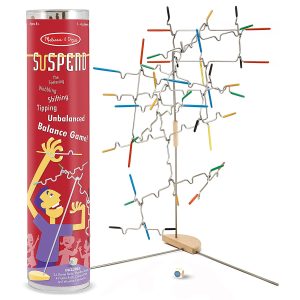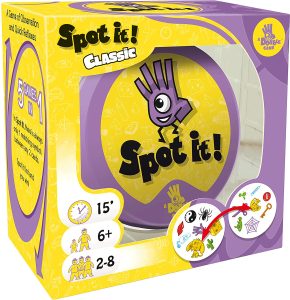When we talk about self-control, it is a highly challenging task. Self-control not only involves controlling physically but emotionally as well. Whether kids or adults, it’s a complex skill. The following tips & toys can benefit in ‘Kids Self control.’ Teaching your child self-control is possible using intelligent techniques. These techniques will help you develop self-control in kids and help them achieve their life goals.
Some Tips To Teach Kids Self-Control
Change The Environment
Sometimes distancing from something plays a very important role for all age groups. It has been observed that to develop self-control in kids, it’s essential to change the environment. It’s simple, keep things out of their sight, which may tempt them. It may be simply keeping them away from their favorite chocolate or pastry, or game. They learn to control themselves just by being away from its sight.
A Fair Return For Self-control
You’ve probably heard of a marshmallow test. Pre-schoolers were given a choice between eating one treat now or two treats later, and the kids who demonstrated the highest capacity to wait ended up, in subsequent years, with better outcomes.
Engage Them In Games Which Involves Self-control
Various games help develop self-control like Balloon tap, Jenga, Red light, Greenlight, Freeze dance, etc. Kids love to play these games, which is unknowingly teaching them self-control. The researchers then assessed these children and concluded that it has helped them develop self-control and noticed remarkable improvement.
Constant Reminders
Kids usually tend to forget if they’re not frequently reminded of rules and regulations. It was observed that if the child was reminded before any task or game, or activity and followed the instructions, they could complete the task easily using impulse control.
Teach Kids’ Throwing Tantrums Doesn’t Work.’
Kids generally throw tantrums as they know you will meet their demands. Parents usually make this mistake and end up teaching the wrong methods of achieving something. We teach them self-control if we decide not to serve them their favourite ice cream or Pizza or Burger just because they are demanding it, despite yelling, screaming, crying, or even pleading.
Kids’ self-control isn’t easy, but it isn’t difficult if we practice correct methods and implement them rigorously.
📣 Loved what you read? Want to go deeper into conscious parenting? ✨ The Power of Manifestation in Parenting is now available — A soulful guide packed with real-life tools like affirmations, energy shifts, and sleep talk that I personally use with my son, Hitarth. 💛 Start your journey toward calmer, connected parenting today. 🎉 Launch Offer: Only ₹99 (limited-time price!) 📲 Instant download. No waiting. 👉 Grab your copy now!.
Encourage Responsibility
We can encourage kids by showing trust in them. Make them feel special. Allow them to make their own decisions. Give them healthy choices and encourage them to choose between them. Make them accountable for their own actions. Assign tasks and remind them to complete those tasks. It helps in developing self-control. Check here some Activities To Do With Babies To Boost Sensory Stimulation.
Set An Example
Kids learn what they see; they follow in their parents’ footsteps. If the parents spend more time on gadgets and cannot control their emotions or get annoyed quickly, the kids will immediately assume it is okay to do that. Likewise, the kids indirectly learn self-control by keeping calm and controlling themselves before answering or reacting to anything.
A Father once asked his child angrily, “Why are you behaving like this”? He replied, “Don’t you always behave the same.”
The father was shocked and moved. It was an eye-opener. Considering the child’s current mindset, the same situation could be handled more politely and calmly. One can’t expect to develop self-control in kids without practising it himself. The best is to implement it ourselves, which in turn is teaching self-control to them.
Set Limit And Deadlines
Once a child learns the value of deadlines, he can easily understand the art of self-control. If you have assigned a task to the kid and he doesn’t submit it on a given deadline, and if you are okay with it, he tends to take advantage and misuse the liberty. The child should know ‘no means no,’ and they cannot take advantage of the same by throwing tantrums or manipulating others. They must know where the boundary is.
Learning Self-control Naturally
When kids play with other kids of different age groups, they need to manage their emotions and impulses.
Every time a kid has been asked to control himself, he sets an example for himself. For instance, if he could hold his urge of controlling himself by not eating from the plate full of cookies and waiting for a bigger reward, maybe a pizza, cake, ice cream, and more, he is learning it naturally.
Self-control includes controlling impulses, emotions, and physical activity. Self-control develops over the years and is most difficult with toddlers. However, self-control is highly essential and can help in the following.
Helps In Achieving The Target
If one has good self-control, he may achieve higher. However, poor self-control will lead to compromise, and the child will be content with whatever he has achieved. For example, a kid may temporarily be happy with candy and satisfy his taste buds but forget the long-term health benefits. By avoiding candy, he could avert the pain in the tooth and prevent cavities in the future.
Self-control Helps In Relationship Building
It has been observed that kids are more happy and content with their relationships. They feel valued and can control their emotions and behaviour. It contributes to the sense of fulfilment. For example, a child may change his habits if he hurts others. The child may even forgive mistakes and build a better relationship.
Ability To Withstand Adversity & Bounce Back
Kids with better self-control could efficiently perform challenging tasks without distraction and have great control over their impulses, even under pressure. Hence, kids self-control is equally important to our control of ourselves. Read here Why Your Kid’s Bad Behavior May Be a Good Thing.
Benefits Health
Poor self-control may affect health. Lack of self-control can lead to complicated health conditions. A kid can use self-control to avoid the temptation of junk food, leading to a better lifestyle. One can avoid getting angry, raising voice, getting rebellious, or even having unnecessary arguments implementing self-control. Self-control hampers not only physical but also emotional health. The child can be accountable for their words and actions by self-control.
Some Toys to Teach Develop Self Control In Kids
We’ve already shared some of our favourite ideas for activities that promote self-control. Now we’ll show you some of the top toys on the market that we’ve discovered to be the best options for practising self-control! In fact, these ideas would make excellent gifts for children whose parents are committed to assisting them in the development of these important skills at home.
Jenga

One of the fantastic and popular games for practising force and speed regulation as well as fine motor control is to use this ancient classic. You can also use packing tape to secure any printed prompts you want to add to each block. We’ve used this method to work on a variety of topics, including social skills, math issues, letter sounds, and more!
[wpsm_button color=”gold” size=”big” link=”https://amzn.to/3EbxuTl” icon=”check-circle” class=”” target=”_blank” rel=”nofollow sponsored”]Check Here[/wpsm_button]
Suspend

This game focuses on a distinct type of self-control: movement management. While it’s a terrific way to improve fine motor skills and control, it can also benefit kids who have trouble controlling the speed and force of their motions.
[wpsm_button color=”gold” size=”big” link=”https://amzn.to/3yGThRv” icon=”check-circle” class=”” target=”_blank” rel=”nofollow sponsored”]Check Here[/wpsm_button]
Spot It

Spot It is one of our go-to games for honing visual skills and increasing attention span. Visual perception and matching skills are developed through the game Spot it. It encourages speedy mental processing and improves cognitive skills while having fun.
[wpsm_button color=”gold” size=”big” link=”https://amzn.to/3FdnmKO” icon=”check-circle” class=”” target=”_blank” rel=”nofollow sponsored”]Check Here[/wpsm_button]
Hammock Swing
Rocking in a hammock is a fantastic solution to introduce relaxing movement that can help with self-control. Any child who is overwhelmed or worried can relax by rocking in a hammock or swaying back and forth. And swings are a wonderful place for a child to take a breather and reflect on their actions.
[wpsm_button color=”gold” size=”big” link=”https://amzn.to/3yFlI2c” icon=”check-circle” class=”” target=”_blank” rel=”nofollow sponsored”]Check Here[/wpsm_button]
Mindful Games Activity Cards
The author of Mindful Games has created a deck of 55 mindfulness games for kids that take a creative approach to developing attention and focus, as well as identifying and managing emotions.
Children can improve their concentration and attention abilities while also becoming more conscious by playing games. This card deck can be used at home or in the classroom to assist parents, caregivers, and teachers build these skills.
[wpsm_button color=”gold” size=”big” link=”https://amzn.to/3sn3Wj8″ icon=”check-circle” class=”” target=”_blank” rel=”nofollow sponsored”]Check Here[/wpsm_button]
Yoga Pretzels
One of the most effective strategies to help children improve their capacity to regulate their emotions and actions is to combine mindful movement with breathing. A yoga dock is a terrific place to start for novices and youngsters who have had previous experience with yoga in therapy, the classroom, or at home.
[wpsm_button color=”gold” size=”big” link=”https://amzn.to/3GTUfwG” icon=”check-circle” class=”” target=”_blank” rel=”nofollow sponsored”]Check Here[/wpsm_button]
Much More…
Apart from these toys, there are much more like memory games, wooden hammers, sand play, puzzles & imaginary games. Click on the link below to check some other self-regulation toys.
[wpsm_button color=”gold” size=”big” link=”https://amzn.to/32aknVl” icon=”check-circle” class=”” target=”_blank” rel=”nofollow sponsored”]Check Here[/wpsm_button]
Conclusion
Self-control is linked to success and the ability to achieve goals. Not all kids can control their impulses all the time, but with self-control, life changes, and the child can set a new vision for the future. Moreover, teaching kids self-control enables them to make appropriate decisions and respond to stressful situations to lead to favourable outcomes.
Your comments and shares do more than just support our blog—they uplift the amazing moms who share their stories here. Please scroll down to the end of the page to leave your thoughts, and use the buttons just below this line to share. Your support makes a big difference!



